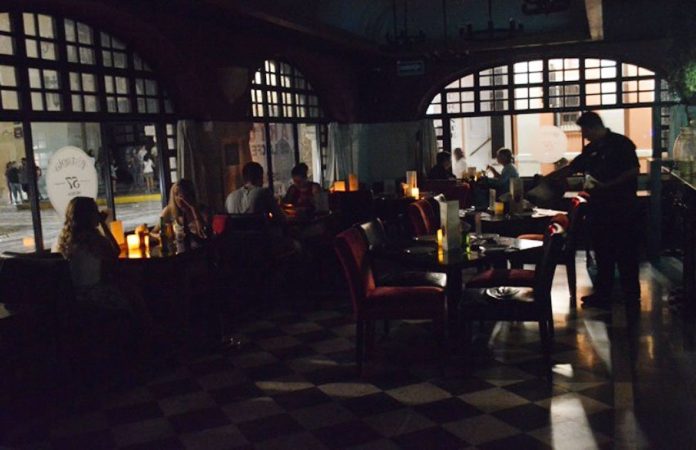A new formula to calculate electricity rates for the industrial and business sectors has caused power bills to soar this year, triggering legal action against the Federal Electricity Commission (CFE) and forcing an unknown number of small businesses to close.
The rising cost of power has also prompted a flood of complaints from affected parties and is putting pressure on inflation.
The pricing formula, which has led to power bills going up by as much as 500%, is based on two main factors: costs related to the generation of power and expenses associated with supplying it, which can fluctuate depending on the time of year.
Behind the price hike, however, are increased costs associated with power generation that are directly linked to the rising price of fuel oil, interruptions to the supply of natural gas and a reduction in the generation of hydroelectricity.
During the third quarter of this year, the CFE reported, fuel costs were up 65% compared to the same period of 2017, “mainly due to an increase in reference prices [and] a lack of gas availability as well as greater costs associated with the sale of fuel to third parties.”
However, according to the chief of the energy division at the National Chamber for Industrial Transformation (Canacintra), electricity prices currently paid by industry and business are, in many cases, well above the figure cited by the CFE.
Francisco Leonardo Anzures González told the newspaper Milenio that many CFE customers have been “severely affected” by the introduction of the new pricing formula, with their power costs increasing between 60% and 500%.
The president of the Confederation of Chambers of Commerce, Services and Tourism (Concanaco) said the price hike has left an as yet unquantified number of business owners with no other option than to shut down.
“Some businesses have already closed. It’s the micro-businesses and small businesses that have shut down already because [the increase] has affected them in an unsustainable way,” José Manuel López Campos said.
“For medium-sized and large businesses, there doesn’t appear to be a risk of closure but an increase in the price of finished products, that could reach consumers at any moment, is envisioned,” he explained.
López said that Concanaco has received more than 40,000 price hike-related complaints from its member companies this years, adding that the new pricing formula has created “a situation that won’t be sustainable in the long term.”
Members of the Mexican Association of Hotels and Motels (AMHM) have taken their opposition to the new electricity tariffs a step further, filing 250 amparos, or injunctions, against them.
Owners of hotels in Los Cabos, Mexico City, Cancún and the Riviera Maya, Oaxaca and Veracruz have initiated the bulk of the legal claims.
Another 100 amparos against the new rates are expected to be filed in the coming days, the AMHM said.
During the past week, various businesses on the Yucatán peninsula, including hotels, gas stations and restaurants, have protested the price hike by completely turning off their power for an hour a day.
“In some restaurants, what they did was put candles [on the tables]. They explained to diners that there would be a power outage and what the reason for it was,” said Juan Manuel Ponce Díaz, president of the Yucatán branch of the Business Coordinating Council (CCE).
“The tourists understood [the idea] very well, some Italians said it was a very good way to express [opposition to the price hikes],” he added.
Ponce said that electricity prices on the Yucatán peninsula are 83% higher than those in Louisiana and 75% higher than in Texas. Both U.S. states are located directly across the Gulf of Mexico from the peninsula’s northern coast.
There is also a possibility that increased electricity costs will force public water utilities to increase the prices paid by consumers because they are allocated fixed budgets to pay for the power they use.
In that context, the Canacintra energy chief said that several water utilities have expressed their concern to the business chamber.
“They tell us that they’re practically bankrupt because their electricity costs have increased between 30% and 50%. They say that they can’t stop [operations] because they have to keep supplying drinking water to cities . . . They’re worried about what effect there will be on the final consumer price because they don’t have any certainty about the cost of electricity,” Anzures said.
All three business sector representatives – Anzures, López and Ponce – contend that the high electricity prices in Mexico, especially compared to the United States, place the country’s economic competitiveness at risk.
“. . . These tariffs are reducing the competitiveness of the whole productive sector. A wholesale adjustment is required,” they said.
They added that approaches have been made to members of the incoming federal government on the issue but there are not yet any clear signals about what will be done with regard to electricity rates.
López stressed that efforts will continue, including petitions to president-elect López Obrador, to ensure that “there is more understanding [on the part of the new government] . . . about the impact [the high prices] have on the productive sector and the population in general.”
Source: Milenio (sp)
